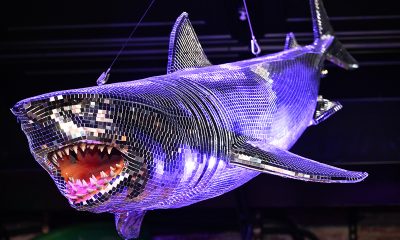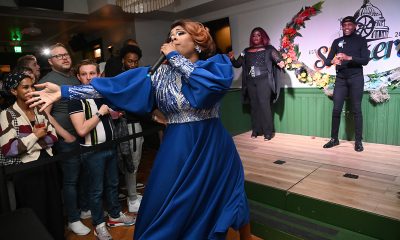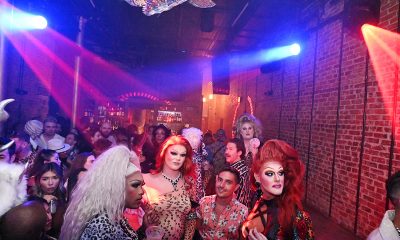Local
A later last call
D.C. gay clubs ponder mayor’s proposal to extend bar hours
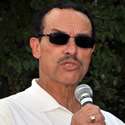
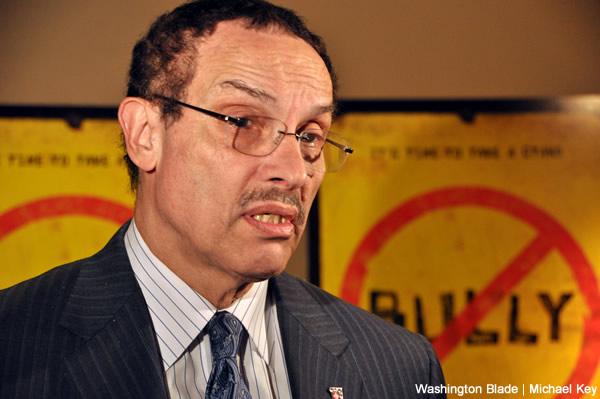
D.C. Mayor Vincent Gray has proposed allowing nightlife venues to extend the time they may serve alcoholic beverages from 2 a.m. to 3 a.m. during the week and from 3 a.m. to 4 a.m. on weekends. (Washington Blade photo by Michael Key)
Customers and owners of the city’s gay bars and nightclubs have joined other city residents in discussing a proposal by Mayor Vincent Gray to allow establishments serving liquor to stay open one hour later each night of the week.
Gray surprised many of the city’s civic activists and Advisory Neighborhood Commission members by attaching the proposal to his fiscal year 2013 budget rather than making it a freestanding bill.
The proposal would allow bars, nightclubs, restaurants and hotels to extend the time they may serve alcoholic beverages from 2 a.m. to 3 a.m. during the week and from 3 a.m. to 4 a.m. on weekends.
“I think there are probably some who like it and some who don’t,” Gray told the Blade last week at a budget briefing he held in Ward 5. “A lot of people who like nightlife are very supportive of it. There are people who say let’s make this a kind of city that has a global and international feel.”
According to Gray and the city’s chief financial officer, Natwar M. Gandhi, the proposal would yield a projected additional sales and excise tax revenue of $3.21 million for fiscal year 2013 and $12.84 million over a four-year period. Gray said the additional revenue would come at a time when the city faces a possible budget shortfall that could result in cuts to important social services programs.
The proposal must be approved by the 13-member D.C. City Council, which is expected to take up the matter later this month or early next month as part of its consideration of the city budget.
Gay D.C. Council member Jim Graham (D-Ward 1), who chairs a Council committee that oversees the Alcoholic Beverage Regulation Administration (ABRA), has come out against the proposal. At a committee hearing Tuesday night, Graham said he agrees with concerns raised by civic groups and a number of ANC commissioners that allowing bars and clubs to remain open another hour would have a harmful impact on many neighborhoods throughout the city.
Opponents testified at the hearing that bars and nightclubs in certain parts of the city, especially in Adams Morgan and Georgetown, would result in noise, heavy traffic congestion, and sometimes disturbances and crime in those neighborhoods. Extending by one hour the closing time for such businesses would only prolong the noise and other problems associated with such businesses, several ANC commissioners said.
Among other concerns, Graham said the city’s public transportation system, especially Metro rail service, would not be operating at the time bars close. Thousands of people who consume alcohol and many who are intoxicated might seek to drive home, putting the public in jeopardy, Graham said.
A clear majority of the more than 40 witnesses that testified before Graham’s Committee on Human Services Tuesday night expressed opposition to the proposal. Most of those opposing the proposal were members of neighborhood civic groups and ANC members.
Gay D.C. Council member David Catania (I-At-Large) has yet to take a position on the mayor’s proposal, according to spokesperson Brendan Williams-Kief, who said Catania is assessing the potential impact of extending bar closing hours.
The D.C. Nightlife Association, whose members include many bars and restaurants, including gay bars, strongly supports the proposal, saying it would boost the city’s economy by strengthening a nightlife industry that accounts for a large number of jobs in the city.
Nightlife Association Executive Director Skip Coburn testified that extending the hours of bar closing times would decrease the problems cited by opponents by staggering the times customers leave and ending the current situation where thousands leave the clubs at the current 3 a.m. closing time on weekends.
Gay nightlife advocate Mark Lee, who also testified before the committee, told the Blade that he and others supportive of the proposals don’t believe civic activists and ANC commissioners always represent the sentiment of a majority of the residents in their districts.
“Those testifying in opposition are the traditional opponents to alcohol licensing regulatory reform and are the relatively few individuals and representatives of small civic groups and ANCs who protest liquor licensing applications and battle to impose so-called ‘voluntary agreements’ and operating restrictions on establishments,” Lee said.
“I, for one, did not find the level of participation by opponents at the hearings to be that significant, as they represented only portions of the city, including only a few areas of the city with prominent dining and entertainment districts,” said Lee, who writes a Blade column on city business issues.
Similar to Coburn, Lee said extending closing hours would create a “calming effect” in high-density entertainment areas.
Other nightlife advocates testifying said not all bars and clubs would choose to stay open until 3 a.m. during the week or 4 a.m. on weekends.
Lee, similar other nightlife advocates, urged the Council not to restrict the extended closing hours to certain parts of the city, such as the downtown business district, as some have suggested.
“Not only will doing so impose a distinct competitive disadvantage to businesses outside a targeted zone, but the benefits of naturally staged patron departures will be eliminated by artificially limiting eligibility,” he said.
Ed Bailey, part owner of the D.C. gay nightclub Town and the gay bar Number 9, said he was especially concerned about allowing the extended hours in some locations but not others.
“That would be an unfair advantage to our competitors,” he said.
Bailey said Town, located at Florida Avenue and 8th Street, N.W., already has permission under the terms of its liquor license to stay open until 5 a.m. on weekends as long as alcohol service stops at 3 a.m. He said the club usually stays open until 3:30 or 4 depending on how late customers decide to stay. But he said the extended hours prevent problems faced by other clubs where large numbers of people leave at the same time.
He said Town has yet to take an official position on the mayor’s proposal.
“We want to provide the best possible event for our patron,” he said. “But we also realize we need to respect our neighbors. We want to make sure we don’t step over any boundaries that are inappropriate for the neighborhood.”
An informal survey by the Blade found that most gay bars in the city favor the mayor’s proposal to extend the closing hours, with a number of them saying they may only choose to remain open an additional hour on certain occasions.
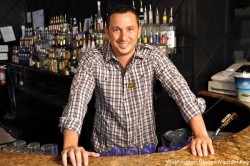
Mark Rutstein, general manager of Cobalt, said Cobalt and JR.’s support the mayor’s proposal to extend the time nightlife venues may serve alcohol. (Washington Blade photo by Michael Key)
“It would come in handy when we need it,” said Greg Zehnacker, owner of the gay bar Green Lantern near 13th and L streets, N.W. “We would do it at times like Gay Pride week.”
Mark Rutstein, general manager of Cobalt, a gay bar on the 17th Street, N.W. entertainment strip near Dupont Circle, said Cobalt and nearby gay bar JR.’s, which are owned by the same company, support the mayor’s proposal. But he said he and other bar and club owners in the popular 17th Street neighborhood are concerned that existing voluntary agreements with the Dupont Circle ANC could lead to serious financial hardship for those clubs.
Rutstein and other club representatives noted that city officials have said ANC voluntary agreements, which are ratified by the city’s Alcoholic Beverage Control Board, would take precedent over the mayor’s proposal for extending bar hours if the ANC agreements call for closing at an earlier hour.
If competing bars and clubs in other parts of the city are not bound by earlier closing hours imposed by ANCs, those establishments could likely draw away customers from the clubs that must close earlier, Rutstein said.
Jerry Griswell, manager of the Dupont Circle gay bar Fireplace, was the only gay bar representative reached who expressed opposition to the mayor’s proposal.
“I don’t like the idea of people drinking another hour at night,” Griswell said. “I don’t think our employees would want to spend another hour at work. I don’t support it.”
Maryland
Md. Commission on LGBTQIA+ Affairs released updated student recommendations
LGBTQ students report higher rates of bullying, suicide

The Maryland Commission on LGBTQIA+ Affairs has released updated recommendations on how the state’s schools can support LGBTQ students.
The updated 16-page document outlines eight “actionable recommendations” for Maryland schools, supplemented with data and links to additional resources. The recommendations are:
- Developing and passing a uniform statewide and comprehensive policy aimed at protecting “transgender, nonbinary, and gender expansive students” against discrimination. The recommendation lists minimum requirements for the policy to address: name, pronoun usage, and restroom access.
- Requiring all educators to receive training about the specific needs of LGBTQ students, by trained facilitators. The training’s “core competencies” include instruction on terminology, data, and support for students.
- Implementing LGBTQ-inclusive curricula and preventing book bans. The report highlights a “comprehensive sexual education curriculum” as specifically important in the overall education curriculum. It also states the curriculum will “provide all students with life-saving information about how to protect themselves and others in sexual and romantic situations.”
- Establishing Gender Sexuality Alliances “at all schools and in all grade levels.” This recommendation includes measures on how to adequately establish effective GSAs, such as campaign advertising, and official state resources that outline how to establish and maintain a GSA.
- Providing resources to students’ family members and supporters. This recommendation proposes partnering with local education agencies to provide “culturally responsive, LGBTQIA+ affirming family engagement initiatives.”
- Collecting statewide data on LGBTQ youth. The data on Maryland’s LGBTQ youth population is sparse and non-exhaustive, and this recommendation seeks to collect information to inform policy and programming across the state for LGBTQ youth.
- Hiring a full-time team at the Maryland Department of Education that focuses on LGBTQ student achievement. These employees would have specific duties that include “advising on local and state, and federal policy” as well as developing the LGBTQ curriculum, and organizing the data and family resources.
- Promoting and ensuring awareness of the 2024 guidelines to support LGBTQ students.
The commission has 21 members, with elections every year, and open volunteer positions. It was created in 2021 and amended in 2023 to add more members.
The Governor’s Office of Communication says the commission’s goal is “to serve LGBTQIA+ Marylanders by galvanizing community voices, researching and addressing challenges, and advocating for policies to advance equity and inclusion.”
The commission is tasked with coming up with yearly recommendations. This year’s aim “to ensure that every child can learn in a safe, inclusive, and supportive environment.”
The Human Rights Campaign’s most recent report on LGBTQ youth revealed that 46.1 percent of LGBTQ youth felt unsafe in some school settings. Those numbers are higher for transgender students, with 54.9 percent of them saying they feel unsafe in school.
Maryland’s High School Youth Risk Behavior Survey reveals a disparity in mental health issues and concerns among students who identify as LGBTQ, compared to those who are heterosexual. LGBTQ students report higher rates of bullying, feelings of hopelessness, and suicidal thoughts. Nearly 36 percent of LGBTQ students report they have a suicide plan, and 26.7 percent of respondents say they have attempted to die by suicide.
The commission’s recommendations seek to combat the mental health crisis among the state’s LGBTQ students. They are also a call for local and state governments to work towards implementing them.
Virginia
Va. lawmakers consider partial restoration of Ryan White funds
State Department of Health in 2025 cut $20 million from Part B program

The Virginia General Assembly is considering the partial restoration of HIV funding that the state’s Department of Health cut last year.
The Department of Health in 2025 cut $20 million — or 67 percent of total funding — from the Ryan White Part B program.
The funding cuts started with the Trump-Vance administration passing budget cuts to federal HIV screening and protection programs. Rebate issues between the Virginia Department of Health and the company that provides HIV medications began.
Advocates say the funding cuts have disproportionately impacted lower-income people.
The Ryan White HIV/AIDS Program, a federal program started in 1990, provides medical services, public education, and essential services. Part B offers 21 services, seven of which remained funded after the budget cuts.
Equality Virginia notes “in 2025, a 67 percent reduction severely destabilized HIV services across the commonwealth.”
Virginia lawmakers have approved two bills — House Bill 30 and Senate Bill 30 — that would partially restore the funding. The Ryan White cuts remain a concern among community members.
Both chambers of the General Assembly must review their proposed changes before lawmakers can adopt the bills.
“While these amendments aren’t a full restoration of what community-based organizations lost, this marks a critical step toward stabilizing care for thousands of Virginians living with HIV,” said Equality Virginia Executive Director Narissa Rahaman. “Equality Virginia plans to continue their contact with lawmakers and delegates through the conference and up until the passing of the budget.”
“We appreciate lawmakers from both sides of the aisle who recognized the urgency of this moment and will work to ensure funding remains in the final version signed by the governor,” added Rahaman.
District of Columbia
D.C. Black Pride theme, performers announced at ‘Speakeasy’
Durand Bernarr to headline 2026 programming

The Center for Black Equity held its 2026 DC Black Pride Theme Reveal event at Union Stage on Monday. The evening, a “Speakeasy Happy Hour,” was hosted by Anthony Oakes and featured performances by Lolita Leopard and Keith Angelo. The Center for Black Equity organizes DC Black Pride.
Kenya Hutton, Center for Black Equity president and CEO, spoke following the performances by Leopard and Angelo. Hutton announced this year’s theme for DC Black Pride: “New Black Renaissance.”
Performers for 2026 DC Black Pride were announced to be Bang Garcon, Be Steadwell, Jay Columbus, Bennu Byrd, Rue Pratt and Akeem Woods.
Singer-songwriter Durand Bernarr was announced as the headliner for the 2026 festivities. Bernerr gave brief remarks through a video played on the screen at the stage.
DC Black Pride is scheduled for May 22-25. For more information on DC Black Pride, visit dcblackpride.org.

